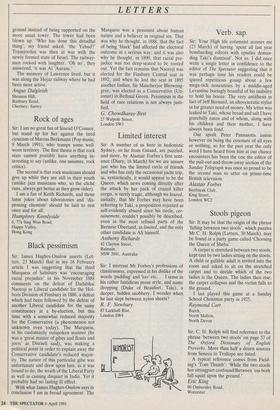Black pessimism
Sir: James Hughes-Onslow asserts (Let- ters, 23 March) that in my 16 February article I was suggesting that the third Marquess of Salisbury was 'encouraging racial prejudice' in his November 1888 comments on the defeat of Dadabhai Naoroji as Liberal candidate for the Hol- born Division of Finsbury in 1886, a defeat which had been followed by the defeat of another Liberal candidate for the same constituency at a by-election, but this time with a somewhat reduced majority for the Conservative (a phenomenon not unknown even today). The Marquess, in his customarily outspoken manner (he was a 'great master of gibes and flouts and jeers' as Disraeli said), was making a political point in order to explain away the Conservative candidate's reduced major- ity. The nature of this particular gibe was unfortunate and drew upon him, as it was bound to do, the wrath of the Liberal Party as well as causing disquiet in India. Yet it probably had no lasting ill effect.
With what James Hughes-Onslow says in conclusion I am in broad agreement. The Marquess was a pessimist about human nature and a believer in original sin. That was why he thought, in 1888, that the fact of being 'black' had affected the electoral outcome in a serious way; and it was also why he thought, in 1890, that racial pre- judice was too deep-seated to be rooted out. Yet the fact remains that Naoroji was elected for the Finsbury Central seat in 1892; and when he lost the seat in 1895 another Indian, Sir Mancherjee Bhownag- gree, was elected as a Conservative (Un- ionist) in Bethnal Green. Pessimism in the field of race relations is not always justi- fied.
G. Chowdharay-Best
27 Walpole Street, London SW3


















































 Previous page
Previous page